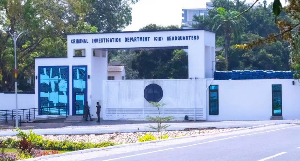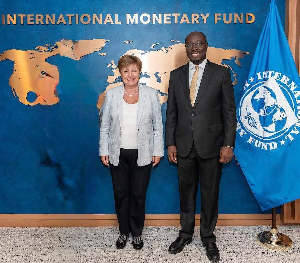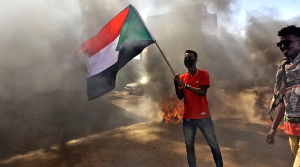The incidence of fire outbreaks in Ghana has significantly increased over the last three years despite the government's concerns and purported interventions. The Ghana National Fire Service, in its recent interaction with the media, described the market fires within the first quarter of 2013 as "not normal", perhaps not in terms of the frequency of occurrence but the pattern. The Service believes that although the fire incidence may not be different from the other years, properties lost are quite significant. Early in 2009, fire devastated hundreds of stalls and shops in Kumasi Central market worth millions of Ghana Cedis and claiming eight human lives. Other market fires recorded this year include that of Agbobloshie, Tema, Kantamanto, Sodom and Gomorrha, Mallam and Madina. In each of these instances properties worth millions decimated amidst loss of lives and instantaneous unemployment of the traders.
It is emphasized here that many other institutions have fallen victims to the fire havoc. This is however not a new phenomenon to Ghanaians. For instance a high number of domestic and factory fires were recorded in the last quarter of 2012 involving scores of deaths. The famous 1983 bush fires that devastated farms including cocoa and other cash crop plantations all around the country ought to guide us in our search for realistic and scientific solutions to the fire menace. What is strange, however, is the ill preparations of the government and other partners in the fight against the inferno which has become an annual ritual.
Any serious country in the twenty first century would adopting abundant scientific and technological approaches to overcome today's challenges. Unfortunately sixty years down the lane of independence, Ghana continues to rely upon unworkable and superstitious methodologies in her quests to solve myriads of challenges that have befallen the country. This attitude runs through the communities where spiritual solutions are sought to alleviate all kinds of human and physical problems including the seemingly unstoppable fire havoc from churches and fetishes. Definitely this is a mark of frustrated society who feel disappointed in their leaders' lack of effective approach and direction. The result of this is fueling of superstition and heightening of fear and panic among the people, and indicision at the leadership level. There is therefore the need as a country to seriously review our approach in preventing and fighting wild fires.
Naturally fire occurs when all the three elements for combustion are present. Collectively called the fire triangle, fuel, heat and oxygen in their right proportions are essential for any fire to ignite and sustained. Ultimately fire can be prevented or extinguished by removing any one of the elements in the fire triangle. For example, covering a fire with a fire blanket removes the "oxygen" part of the triangle and can extinguish a fire. This is the reason why doors and windows must be shut whenever there is fire in a building. The rampant outbreak of fire in the country during the dry and hot seasons especially from November to April is due to the excessive heat. Many of our houses and market stalls in Ghana are so much clustered and with limited ventilation. A situation of this nature leads to excessive buildup of heat and thus facilitating fire outbreak. Regrettably many of our homes, market stalls and shops are stuffed and overcrowded with goods and materials which are good fuel to support fire. These elements of fire initiation and control are hardly understood by the general public due to lack of effective and regular public education on fires in the country. Building officials on the other hand do not apply these principles in their construction work and therefore creating building facilities that are not fire resistant. Equally, the state's building regulators do not enforce proper construction of buildings especially with vulnerability to fire outbreaks.
Considering the increasing flouting of fire rules both within domestic and industrial settings all over the country, from residential houses and schools to factories and markets, Ghana is lucky to have recorded lower incidence of fire outbreaks. There seems to be little application of science and technology in daily dealings of the citizenry. Until the country adopts holistic scientific and technological measures, in fact the most logical working procedures, no significant progress would be possible.
Indeed Ghana is an interesting country. One of the first priorities of the first indigenous administration of the country and in fact in most other African countries was to invest heavily in human resource development. This was done especially in the areas of science and technology which even at the time were considered the key to industrialization and overall national and continental development. Even at the time when Ghana was importing brains from the west, the country pursued many developmental projects that hinged on science and technology. Research was the backbone of the country's economy and in fact the president was the National Research Coordinator. Relatively within very short time important projects such as Akosombo Dam (VRA) came into fruition. But today when Ghana has its own training institutions, universities and technical institutes, churning out abundant supply of various human resources including scientists and technologists, the situation is even worse.
Fire havoc is now a national concern and many prominent people including the president have suggested the use of foreign forensic experts to unravel the root cause of the market fires. The question worth asking now is, "what is the relevance of spending the scarce resources of the state to train our local experts if they not needed in providing solutions to our problems?" It should be a matter of worry if the Fire Service of Ghana, like other service providers, could not be made to find answers to the recurring fire incidence, and generating workable and implementable strategies to reduce, if not eliminate entirely, the market and other forms of fires.
The government as the major stakeholder should initiate programmes that will make use of the local experts as they are as good as others abroad. In the United States, where it is believed that fire forensic experts are being sought by th Ghanaian authorities, professors from universities and colleges are constantly recruited to provide expert services to their government and private companies. This cannot be said about our professors and researchers who are for now only relevant in the classroom. Every expertise in a nation, irrespective of its origin, whether from party A or B, or tribe X or Y, remains a God-giving talent of Ghana and must be put to work.
This article does not cast insinuations at the long-held views of the African traditional beliefs in attempting to solve problems of national concern but rather to direct our attention to what we can easily achieve with the available scientific and technological knowledge accumulated over the years by our God-giving talents since mankind's existence. Wheels are not to be reinvented but rather to be harnessed to solve mankind's problems as demonstrated recently in China.
Every scientific work begins with a hypothesis. This is not very different from the political guesses, for example, what might have been the cause of the high incidence of the market fire outbreaks. However, the difference between the two perspectives lies in the science's methodology that requires testing series of hypotheses to arrive at the correct answer. Ghana has what it takes to solve her problems and as such leaders should show interest and to provide the needed resources to the local experts. There should also be a reciprocal demand of solutions by the people from these experts whose research activities are financed from the public purse.
Peter O. Twumasi (PhD)
Senior Lecturer and Research Scientist
Opinions of Tuesday, 11 June 2013
Columnist: Twumasi, Peter O.














